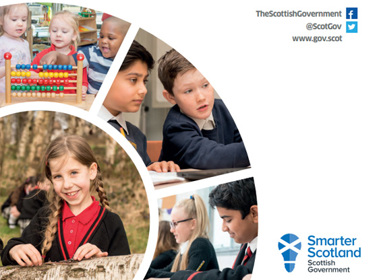Delivering Excellence and Equity in Scottish Education
On 28 June 2016 John Swinney, Deputy First Minister and Cabinet Secretary for Education and Skills, published ‘Delivering Excellence and Equity in Scottish Education - A Delivery Plan for Scotland’.
The Delivery Plan outlines the steps the Scottish Government will take to achieve key improvements in education, building on the work contained in the National Improvement Framework which was published in January 2016, and addresses the recommendations of the OECD review Improving Schools in Scotland: An OECD Perspective (December 2015). The suite of documents on this page provides clear, practical advice for teachers and practitioners on planning learning, teaching and assessment. This streamlined approach includes a definitive Statement on Curriculum for Excellence and Benchmarks to support assessment across the curriculum.
The Statement on Curriculum for Excellence
The Statement on Curriculum for Excellence provides key messages about what teachers and practitioners are expected to do to effectively plan learning, teaching and assessment for all learners. An appendix summarises and clarifies key information on the curriculum framework within which teachers and practitioners are expected to teach.
PDF file: Curriculum for Excellence Statement (233 KB)
PDF file: Curriculum for Excellence Statement - Gaelic (185 KB)
Benchmarks
The Curriculum for Excellence Benchmarks set out clear statements about what learners need to know and be able to do to achieve a level in subjects across the curriculum.
Review of local authorities’ actions to tackle unnecessary bureaucracy and undue workload in schools
In June 2016 the Deputy First Minister and Cabinet Secretary for Education and Skills requested HM Inspectors to carry out a focused review of the demands placed on schools by each local authority in relation to Curriculum for Excellence. This review took place in August 2016. Inspectors looked at arrangements, expectations and associated workload requirements placed on schools by the local authority, as well as any guidance and support provided by the authority to help minimise bureaucracy and workload. This report sets out the findings of the review.
PDF file: Letter from Deputy First Minister (103 KB)
PDF file: Review of Local Authorities' actions (116 KB)
Driving Excellence and Equity: Advice on School Improvement Planning 2017/18
This resource provides essential advice and support on how partnership approaches can work constructively, to create a meaningful improvement plan.
This resource is for schools, working with parents, carers, partners and their local communities.
Schools should engage with all local stakeholders, with a particular emphasis on parents and carers, to create a shared improvement plan. The increased emphasis on partnership approaches is intended to achieve greater impact on children’s and young people’s attainment and achievement.
Securing the widespread support of the school community will help achieve a significant, positive impact on children’s and young people’s experiences and outcomes.
To find out more, go to our Driving Excellence and Equity: Advice on School Improvement Planning page.

